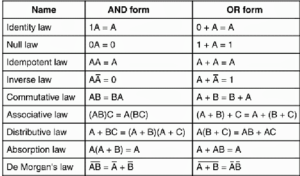In mathematics, Boolean Algebra is a special type of algebraic structure, a type of general algebra used in mathematics, theoretical computer science, and digital electronics. Its name comes from the name of the mathematician, philosopher, and logician George Boole.
The theory of Boolean algebras is a branch of mathematics at the intersection of partial order theory, algebra, mathematical logic, and topology (the properties of a geometric object).
Typical examples of Boolean algebras are the family of all subsets of a fixed set with operations on the sets as algebra operations, and the two-element algebra of logical values {0, 1} with operations of conjunction, alternation, and negation.
History Of Boolean Algebra
The term “Boolean Algebra” was named after George Boole (1815–1864), a self-taught British mathematician. He first intervened in the algebraic logic system in a pamphlet “The Mathematical Analysis of Logic” published in 1847, in response to the public debate between Augustus de Morgan and William Hamilton, and later appeared in 1854.
Published a more substantial book “The Laws of Thinking“. The formulation of Boolean differs from the above description in some important respects. For example, the conjunction and disjunction of Boolean are not a dual operation. Boolean algebra appeared in the essays of William Stanley Jevons and Charles Peirce in the 1860s.

